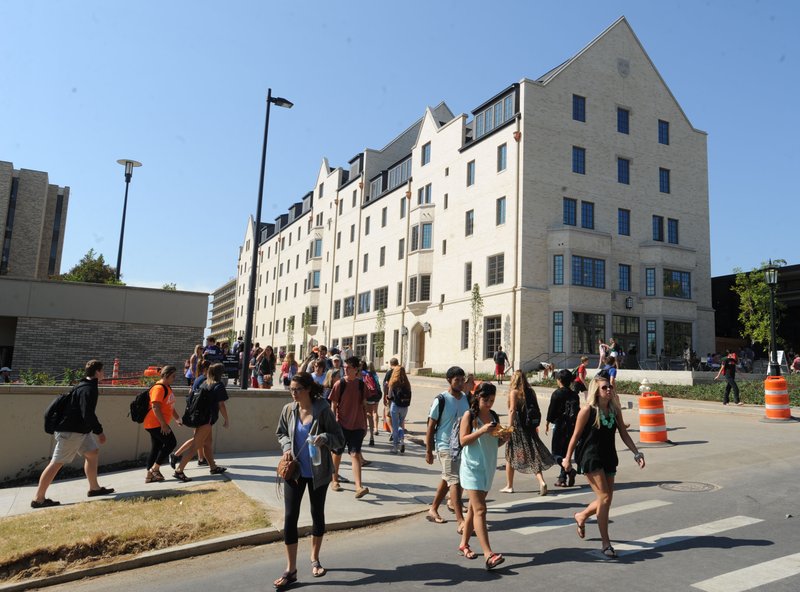FAYETTEVILLE -- A lawsuit that challenged how the University of Arkansas, Fayetteville decides student sexual assault cases will be allowed to continue, but a federal appeals court Friday rejected arguments by a student sanctioned for misconduct that the way the campus handled the complaint against him clearly violated his due process rights.
The 8th Circuit Court of Appeals ruling on a lawsuit filed by "John Doe" states there is a "plausible claim that the University discriminated against Doe on the basis of sex."
The opinion comes in an appeal filed by "Doe" after U.S. District Judge P.K. Holmes III in April 2019 dismissed his lawsuit. Holmes had earlier issued an order allowing a pseudonym to be used in the lawsuit, filed in September 2018 in U.S. District Court in Fayetteville.
"We are pleased that the Eighth Circuit affirmed the District Court's decision to dismiss the due process claims against the University and other named defendants," UA spokesman Mark Rushing said in an email. "Beyond that, we are still reviewing the Court of Appeals decision. The University remains committed to providing fair and thorough processes for complainants and respondents alike in these cases."
Heather Zachary, a Little Rock attorney representing "Doe," said in an email that the ruling "is a victory for college students everywhere and will help ensure that university disciplinary procedures are administered in a non-discriminatory manner to all involved parties."
Zachary said "we are currently weighing our options" about the decision as it relates to claims that UA violated due process. She said the university has not provided a transcript of the campus hearing.
"We believe the process enacted against our client was fundamentally unfair and that the hearing transcript will further reveal this unfairness," Zachary said.
Court documents state that "Doe" was found responsible for sexual misconduct, sanctioned and required "to complete Title IX training, 10 hours of community service and an online sexual violence accountability course." He was allowed to graduate.
Under Title IX, sex-based discrimination is prohibited at schools receiving federal money. A new federal rule that took effect last month has changed requirements for colleges and universities, but schools are still required to investigate certain cases of sexual harassment and sexual assault involving students.
These proceedings are separate from any police investigation and can result in a campus hearing panel deciding if a student is responsible for misconduct.
The appeals court opinion states that "the allegations in the complaint support an inference that the hearing panel reached an outcome that was against the substantial weight of the evidence."
The opinion also notes the claim by "Doe" that UA had been under pressure because of a separate lawsuit filed by a former student alleging that the university mishandled her Title IX complaint after she reported being raped, as well as public actions taken by the alleged victim in the "Doe" case.
The initial ruling by UA's Title IX coordinator was a finding that "Doe" was not responsible for misconduct after a complaint made by "Jane Roe" that she had been assaulted.
"Roe" appealed that decision, ultimately leading to "Doe" being sanctioned. "Doe," in his lawsuit, also alleged that she "personally orchestrated a campus-wide protest after the Title IX coordinator found that Doe was not responsible for the sexual assault against her," the opinion states.
The opinion, written by U.S. Circuit Judge Steven M. Colloton, states that the lawsuit by Doe alleges both "a dubious decision in his particular case taken against the backdrop of substantial pressure on the University to demonstrate that it was responsive to female complainants." The opinion states that the allegations "are sufficient to state a claim under Title IX that is plausible on its face."
The appeals court ruled against arguments that procedures at UA violated the due process rights of "Doe."
Some of the procedures named in his lawsuit as being contrary to due process have been in wide use at many colleges and universities, such as using a preponderance of evidence standard to decide campus sexual assault cases.
The standard means that something is more likely than not to have occurred.
Regarding the preponderance of evidence standard, the appeals court opinion states that "we do not think a higher standard of proof is compelled by the Constitution."
Some of the arguments made by "Doe" related to the lack of direct cross-examination in his hearing.
The new federal rule championed by U.S. Education Secretary Betsy DeVos -- and criticized by some advocacy organizations such as the National Women's Law Center as making it harder for victims to come forward -- emphasizes due process principles and requires colleges and universities to allow cross-examination by advisers.
In the hearing that led to sanctions against "Doe," questions were submitted to a hearing panel and the panel had discretion about whether to ask the questions.
The opinion by the federal appeals court states that a "process under which the adjudicating panel poses questions to witnesses is 'not so fundamentally flawed as to create a categorically unacceptable risk of erroneous deprivation,"' citing a 2019 ruling by the 1st Circuit Court of Appeals.
When it comes to the campus hearing involving "Doe," his lawsuit "does not identify any material flaw in this proceeding," the opinion states.
